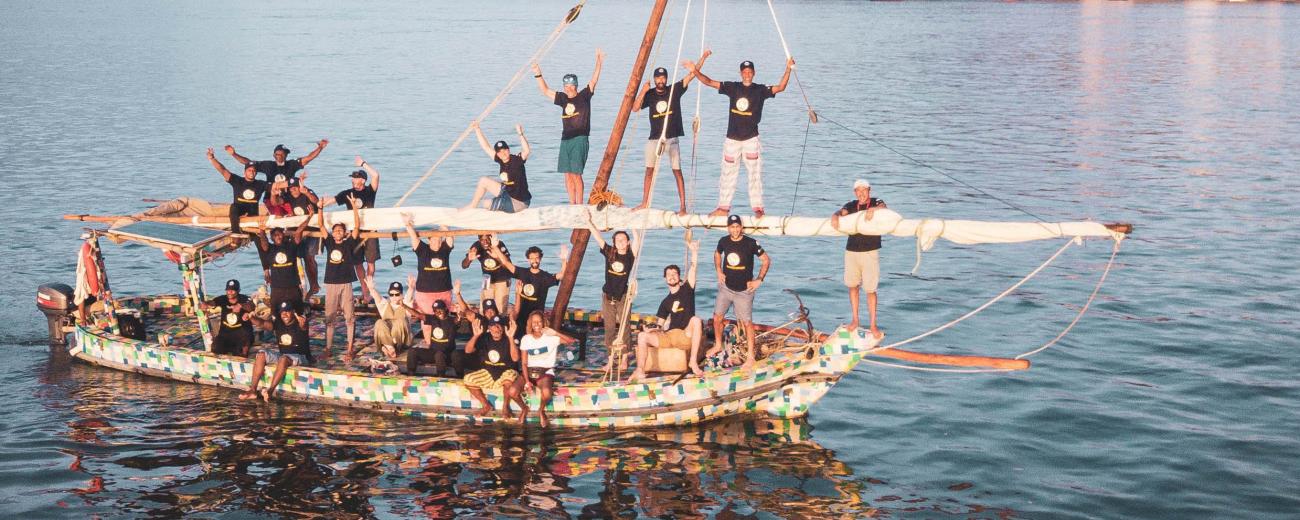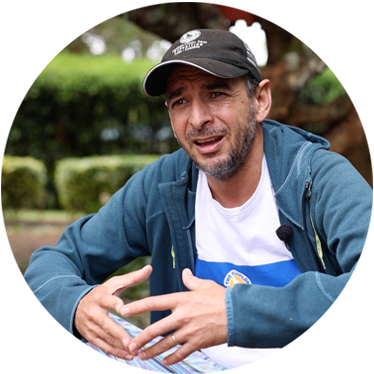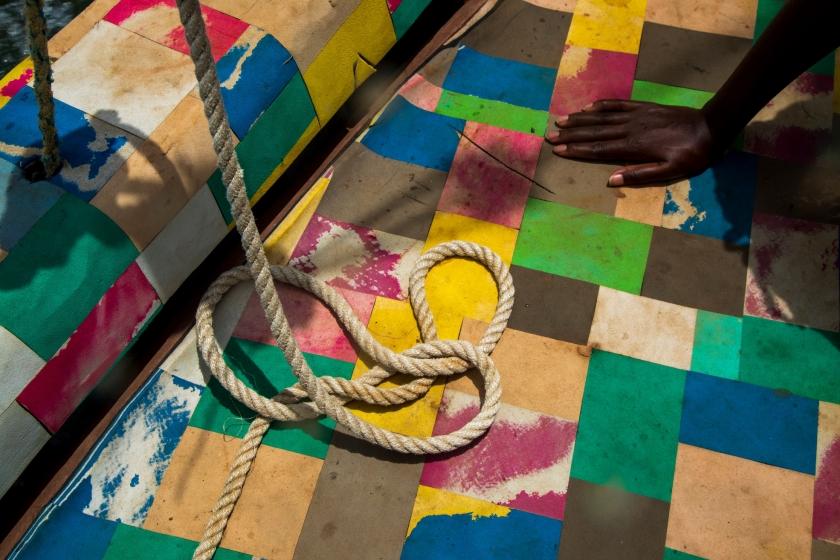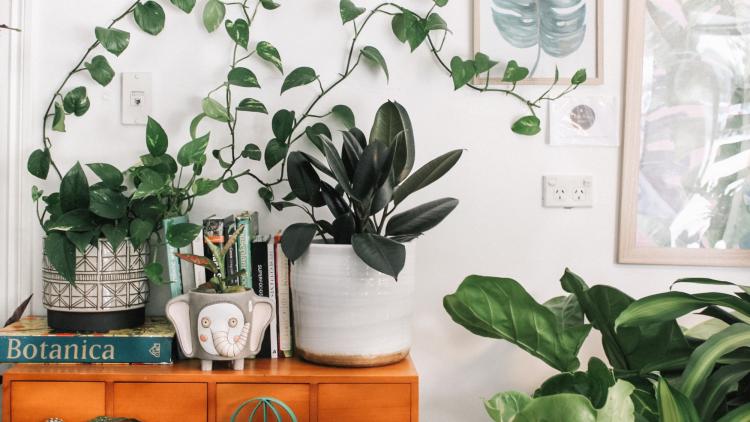Careers: How Dipesh uses creative local solutions in Kenya to tackle plastic waste


A fellow SOAS alum, Joseph Brammer, interviewed Dipesh Pabari to find out about his career, how he's influenced by art and activism, and his project to end plastic waste in East Africa.
MA Anthropology alum Dipesh Pabari is the Co-Founder and Managing Director of The Flipflopi Project, an East African movement that is working to bring an end to plastic waste through local circular economic approaches.
Located on Lamu Island, off the coast of Kenya, The Flipflopi Project recovers and recycles post-consumer plastic into durable plastic timber to create artisanal furniture and heritage boats through traditional expertise. Flipflopi is the world’s first sailing dhow made entirely from recycled plastics. It was constructed using 10 tons of plastic and clad in 30,000 flip-flops collected from Kenya’s beaches.
As a fellow alum, I met Dipesh during my previous role at ARK Group International. I was amazed at the work he and the Flipflopi team were achieving, and I have been supporting the movement ever since. With both of us being SOAS alumni, I sat down with Dipesh to discuss how SOAS had impacted his career and why the university continues to empower change-makers.
Single-use simply does not make any sense - certainly not for plastics.
A handful of volunteers built the world’s first sailing dhow made of plastic. Can you describe how that came about?
I had always been interested in art and activism, and the idea of using the problem itself - plastic waste - in an artistic and productive way to try and solve an issue deeply resonated with me.
I was inspired by various artists and organisations turning trash into art and had a new sense of admiration and respect for the incredible creativity of children in Kenya turning trash into toys. It sparked my interest in using creative approaches to tackle a problem.
At The Flipflopi Project, we created the world’s first sailing dhow made entirely from recycled plastic and covered it in discarded flip-flops, which was an incredible idea from an old schoolmate, Ben Morison – and then took it on three sailing expeditions to educate people on plastic waste.
If you can build a seaworthy sailing vessel entirely from used and discarded plastics, it shows you just how ridiculous our linear consumption model is. Single-use simply does not make any sense - certainly not for plastics.
Using plastic itself in a positive way seems to be a big part of Flipflopi’s ethos. Why did you pick to create a dhow out of plastic?
Our master craftsman and co-founder Ali Skanda always says that the “Dhow was the first form of communication on culture.” This vessel predates European presence in this region and has been connecting people from across the Indian Ocean for centuries.
For us, it was more than just building a boat out of recycled plastic - it was about creating a symbol of everything that is right and wrong in our species and creating something that was not just functional but a moving story - a colourful and positive one that did indeed capture hearts and minds. It also laid the foundation to establish a full systems approach to tackling plastic pollution across the Lamu archipelago.
Can you describe the full systems approach in Lamu?
Today, we work with local communities to recover between 12-15 tonnes of plastic monthly, establish our own recycling centre and convert the hard plastics into usable plastic lumber. We then work with and train local carpenters to use their expertise to craft beautiful, ornate, traditional furniture and different types of artisanal boats. There are plenty of challenges, but we are determined to keep going.
What are your aims moving forward and what are you excited about?
Despite the exponential growth of plastic consumption, I am optimistic that we can solve this problem in our lifetime. We don’t have a choice!
There is rapid population growth in East Africa, including in peri-urban spaces with little to no waste management. As an organisation, we recognised we had to take a holistic approach to the problem and tackle it on all fronts, from shaping policies that support circular economies to coming up with relevant solutions and building opportunities for the local communities to be the maximum beneficiaries within their own localities.
"When deciding on a career choice, I would ask: what can I do that will make a positive contribution to the wellbeing of others or to the planet?"
What really excites me is how Lamu has gone from a small, relatively unknown island off the coast of Kenya to now having a voice at the global table that provides indigenous representation. If a small, dedicated team here on Lamu Island can achieve that, imagine what other creative local solutions are also out there?
How did your time at SOAS affect your career?
In two fundamental ways, I would say. It provided me with the intellectual toolkit I needed to better understand the world and myself. I really enjoyed the freedom and opportunity SOAS gave me to encounter and study thinkers who helped me understand myself and so many other cultures.
Being half-Indian, half-Turkish, and born in Kenya almost fifty years ago certainly came with its challenges in terms of belonging. However, encountering academics like Homi K. Bhabha at SOAS and his notion of “third space” helped to affirm my sense of place and belonging. And more importantly, my time at SOAS inspired me.
What career advice do you have for current students?
That’s a tough one. Things have changed so much over the past twenty years, but when deciding on a career choice, I would ask: what can I do that will make a positive contribution to the wellbeing of others or to the planet? What can I do that will give as much, if not more than what I take?
We have been privileged to have had an incredible education at an institution like SOAS; the last thing that should be guiding our choice is money! Sure, we all want to live comfortably, but not If it comes at the expense of others.
Header image credit: Courtesy of The Flipflopi Project.
About the author
Joseph Brammer is a British climate activist, volunteer, and international development practitioner. He currently works as the Partnerships Officer for Africa at the London office of BRAC, a Southern-led organisation, to support the development of partnerships for programming in East and West Africa. Joseph possesses over five years of experience in the international development sector, working across advocacy and policy, supporting social enterprises across Africa, and several in-country placements. He holds a master's in Development Studies from SOAS University (2021) and seeks to mobilise his postgraduate research to combat extreme poverty and support climate resilience.




